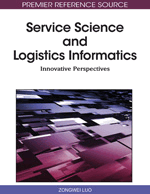“Service Science and Logistics Informatics: Innovative Perspectives” – the title of this book combines the three major challenges in modern logistics and supply chain management; Services, informatics and innovation. These enablers influence mainly the success of business logistics both on a regional level as well as on an international level. They have to be designed and operated having in mind that world trade flows are interconnected and modi-fiable. Logistics has to ensure distributed production in a dynamic environment on a regional and on a global scale. In line with this, especially the service sector has been playing an in-creasingly important role in world economy. New businesses, new distributions of tasks and new value added services in international supply chain networks have occurred and will oc-cur in future. Moreover, new innovative control philosophies for logistics operations based on the realization of IT based autonomous decentralized cooperating systems will improve the logistics efficiency in the next years. These developments are confronted with present and future challenges on climate change as well as on international security aspects. More-over a sustainable trade off between business and living, production and logistics has to be found. The quality of the design and sustainable operation of these relations, and by this, of the innovative design and management of services, can be supported by knowledge man-agement between decision makers as well as common learning.
This book provides updated materials disclosing innovative findings for applied research and development in the interdisciplinary fields between service science and logistics informatics. It covers chapters entitled innovation strategies, service innovation, services sourcing and industry service models. By this, it aims to provide researchers, practitioners, and academi-cians with insight into selected yet important topics relevant to logistics and supply chain industries. It provides both business and IT professionals a reference for practices and guide-lines to service innovation in logistics and supply chain management. As a first of its kind, this book addresses latest applied service science research and industry practices on emerg-ing enabling technologies including RFID, service innovations in logistics and supply chain management, and the transformations of a more efficient economy. The book, built on an excellent portfolio of accepted chapters, including the observations and reports on the world’s biggest retailers, world’s busiest airports, and world’s most dynamic regions, to in-troduce service innovation in modernizing logistics and supply chain management, serve as a prestigious reference to disseminate the state of the art research, development, and ad-vances of service innovation in logistics and supply chain management.
Prof. Dr. Hans-Dietrich Haasis
Director, ISL – Institute of Shipping Economics and Logistics, Bremen, Germany
www.isl.org
